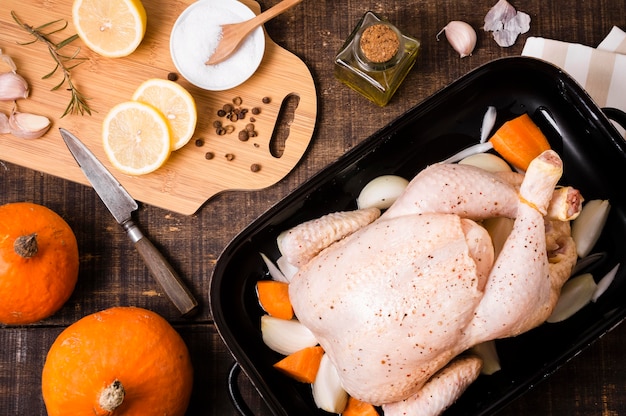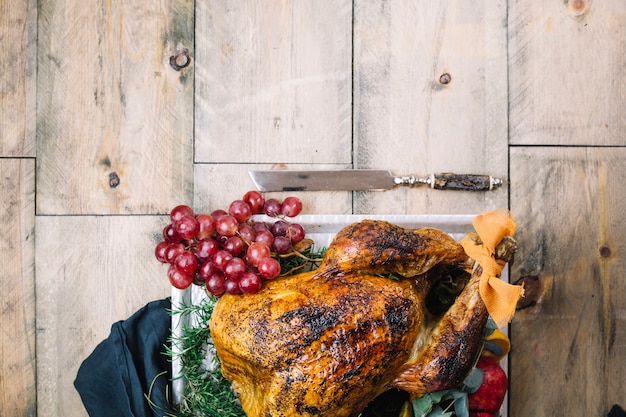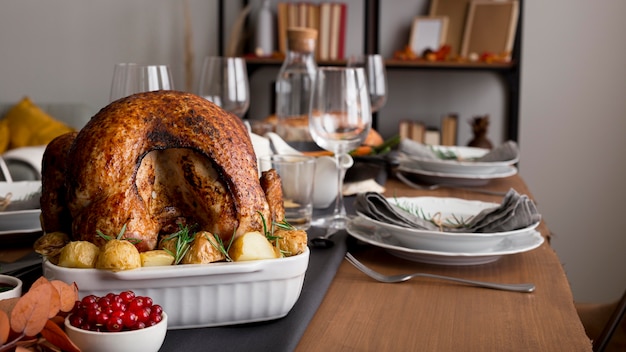(Part 1) Choosing Your Turkey

Free-Range, Please
If you're aiming for top-notch quality, go for a free-range turkey. The flavour and texture are simply superior. Look for a golden hue on the skin – it's a good indicator of quality.Sizing Up the Bird
Now, size matters. It's all about how many hungry mouths you need to feed. I prefer a larger turkey, usually around 10-12kg, as it's easier to have leftovers than to be left short.The Art of Thawing
Thawing your frozen turkey properly is crucial. The safest and most reliable method? The refrigerator. It takes approximately 24 hours for every 4.5kg of turkey to thaw. So, if you've got a 10kg bird, plan for at least 48 hours of thawing time.The Brine Bath
Brining is a magic trick that transforms a regular turkey into a juicy, flavorful masterpiece. Essentially, you soak the turkey in a salty water solution. It adds flavour and moisture, keeping the meat tender and delicious. You can find tons of recipes online, but I prefer a simple blend of salt and water, with a few herbs for extra oomph.(Part 2) Preparing Your Turkey

The Stuffing Dilemma
Stuffing is a delightful addition, but it does affect cooking time. Stuff it loosely, giving the filling room to cook through properly. Overfilling the cavity will lead to undercooked stuffing. I always use a meat thermometer to ensure my stuffing reaches a safe internal temperature of 74°C (165°F).Butter, Herbs, and Seasoning
Now's your chance to get creative! Butter, herbs, and seasoning are your secret weapons to transforming your turkey into a culinary triumph. I use a mix of fresh rosemary, thyme, and sage, rubbed under the skin with a generous pat of butter. It's a bit messy, but the flavour payoff is worth it.Calculating Cooking Time
Time for some math! Remember that 20-25 minutes per 450g (1lb) rule? That's for an unstuffed turkey. If you're stuffing, add an extra 30 minutes. This is just a guideline, as oven temperatures and turkey size can influence the final cooking time.(Part 3) Cooking Your Turkey

Preheating is Key
Always preheat your oven to 180°C (350°F) before you even think about placing your turkey inside. A preheated oven ensures even cooking and helps prevent a dry turkey.Roasting Time and Temperature
That estimated cooking time is just a starting point. You need to check the internal temperature with a meat thermometer to ensure your turkey is cooked through. Aim for an internal temperature of 82°C (180°F) in the thickest part of the thigh.The Basting Ritual
Basting is a game-changer. Every 30 minutes, spoon those pan juices over your turkey. It helps keep the meat moist and adds a beautiful golden glow. Yes, it takes a bit of extra effort, but trust me, it makes a world of difference.The Resting Period
Once your turkey is cooked, don't rush into carving. Give it a good 30-minute rest. This allows the juices to redistribute throughout the meat, resulting in a tender, succulent turkey.(Part 4) Checking for Doneness
Nobody wants to risk a foodborne illness, so checking for doneness is crucial.The Meat Thermometer's Role
The best way to guarantee your turkey is cooked to perfection? A meat thermometer. It's a small investment that pays off in peace of mind.Visual Clues
If you don't have a thermometer, you can look for visual cues. The juices should run clear, not pink, and the flesh should be white, not pink.Oven Temperature Variations
Remember, oven temperatures can vary, so even if you've followed all the guidelines, it's always wise to err on the side of caution and check the temperature just to be safe.(Part 5) Carving Your Turkey
Finally, the moment of truth: carving! Here's how to ensure beautiful slices of turkey, perfect for serving.Sharpen Your Tools
First, a sharp carving knife is essential. A dull knife will only make your life difficult and could even tear the meat.From Breast to Legs
Start by slicing the breast lengthwise in half. Then, slice across the grain, keeping them thin for easy serving. Next, separate the legs from the carcass, slicing the thigh meat into thin pieces.Carving Tips
Feeling a bit overwhelmed? Don't worry! There are plenty of excellent carving videos online to guide you. Practice makes perfect!(Part 6) Leftover Turkey
Let's face it, you're bound to have some leftover turkey. But don't see it as a leftover, see it as a delicious opportunity!turkey sandwiches
A classic for a reason, turkey sandwiches are a satisfying way to use up those leftovers. Add some cranberry sauce, stuffing, and mayonnaise for a festive twist.turkey soup
Turkey soup is a comforting and warming choice. Simmer the turkey bones with vegetables to create a flavorful broth.Turkey Curry
Feeling adventurous? A turkey curry is a delicious and exotic way to use up leftovers.turkey salad
A light and refreshing option, turkey salad is perfect for a quick and easy meal. Mix shredded turkey with mayonnaise, celery, and onions.(Part 7) turkey cooking mistakes
We all make mistakes, but with a little knowledge, you can avoid these common turkey cooking pitfalls.Overcooked Turkey
Overcooked turkey is a recipe for dryness and toughness. Always check the internal temperature to ensure it's cooked through but not overdone.Undercooked Turkey
Undercooked turkey is a serious food safety hazard. Make sure the internal temperature reaches 82°C (180°F).Stuffing the Bird
Stuffing can affect cooking time, so remember to factor that into your calculations.Skipping the Resting Period
Resting your turkey allows the juices to redistribute, resulting in tender, flavorful meat. Don't skip this crucial step.(Part 8) Turkey cooking tips
Here are some tips to help you cook a turkey that's a culinary triumph:Roasting Rack Advantage
A roasting rack elevates the turkey off the bottom of the pan, allowing air to circulate for even cooking.Meat Thermometer Power
A meat thermometer is your best friend for ensuring your turkey is cooked through.The Basting Magic
Basting keeps your turkey moist and flavorful.The Resting Ritual
Give your turkey at least 30 minutes to rest after cooking.FAQs
Q1. How long should I cook a 10kg turkey?
A 10kg turkey will take around 4 hours to cook. However, always check the internal temperature to guarantee it's cooked through.
Q2. What temperature should I cook a turkey at?
Cook your turkey at 180°C (350°F) for even cooking and a juicy result.
Q3. What is the best way to tell if a turkey is cooked?
A meat thermometer is the ultimate tool for checking doneness. The internal temperature should reach 82°C (180°F) in the thickest part of the thigh. You can also look for clear juices and white flesh.
Q4. How long should I rest a turkey after cooking?
Allow your turkey to rest for at least 30 minutes to redistribute the juices for a tender and flavorful result.
Q5. What are some good ways to use leftover turkey?
Leftover turkey is a delicious ingredient in sandwiches, soup, curry, salad, and more. Get creative with your culinary creations!
Final Thoughts
cooking a turkey can seem intimidating, but with a little planning and knowledge, it's a rewarding experience. Remember, it's about achieving that perfect balance of juiciness, tenderness, and flavor. So, gather your ingredients, grab your meat thermometer, and prepare to create a culinary masterpiece! You're going to impress everyone at the table this year. Happy cooking!Everyone is watching

Prime Rib Roast Cooking Time Chart: Per Pound Guide
Cooking TipsPrime rib roast. Just the name conjures images of lavish dinners, crackling fires, and hearty laughter. It’s ...

How Long to Bake Potatoes in the Oven (Perfect Every Time)
Cooking TipsBaked potatoes are a staple in my kitchen. They're incredibly versatile, delicious, and surprisingly easy to m...

Perfect Rice Every Time: The Ultimate Guide to Cooking Rice
Cooking TipsAs a self-proclaimed foodie, I've always been a bit obsessed with rice. It's the foundation of countless cuisi...

The Ultimate Guide to Cooking Asparagus: Tips, Techniques, and Recipes
Cooking TipsAsparagus. The mere mention of this spring delicacy conjures up images of vibrant green spears, crisp and burs...

Ultimate Guide to Cooking the Perfect Thanksgiving Turkey
Cooking TipsThanksgiving. Just the word conjures up images of overflowing tables laden with delicious food, the scent of r...
